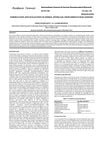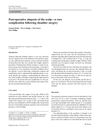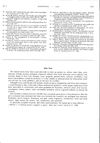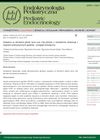
Search
for
Sort by
Research
690-720 / 1000+ results

research Formulation and Evaluation of Herbal Hydrogel from Hibiscus Rosa-Sinensis
The hydrogel with 20% Hibiscus rosa-sinensis extract was the best for potential therapeutic use.

research Introduction to Innovations in the Immunology and Clinical Science of Alopecia Areata
New research is helping develop better treatments for alopecia areata.

research Cutaneous Epithelial Stem Cells
Skin and hair renewal is maintained by both fast and slow cycling stem cells, with hair regrowth primarily driven by specific stem cells in the hair follicle bulge. These cells can also help heal wounds and potentially treat hair loss.

research Post-Operative Alopecia of the Scalp: A Rare Complication Following Shoulder Surgery
A woman's hair grew back within 3 months after temporary hair loss from improper head positioning during shoulder surgery.

research British Society for Dermatopathology 2011 Findings
Dermatologists give better information on pathology forms, hypersensitivity vasculitis is a common skin issue, misdiagnoses can occur, and various skin conditions are linked to loss of elastin or genetic factors.

research Hyperpigmentation and Melasma
Hyperpigmentation is common in pregnancy and may not fully fade after birth; melasma, also frequent, can persist but has limited treatment options during pregnancy.

research Secondary Cicatricial and Other Permanent Alopecias
The document concludes that permanent hair loss conditions are complex, require early specific treatments, and "secondary permanent alopecias" might be a more accurate term than "secondary cicatricial alopecia."

research Apply Directly to the Forehead: Holmes, Nana, and Hennapecia
Henna mixed with PPD can cause skin reactions, scarring, and a specific type of baldness, and needs more research to understand these effects.

research Dermatological Drugs and Topical Agents
Certain skin drugs and topical agents, including some natural extracts and fragrances, can cause allergic reactions. Some hair dyes and extensions, as well as minoxidil, a hair growth treatment, can also cause allergies. Botulinum toxin A can effectively reduce sweat but may have temporary side effects.

research Cytostatics and Immunosuppressive Drugs: Toxicities and Management
Some cancer and immune system drugs can cause serious side effects, including heart, lung, nerve, and organ damage, which need careful monitoring and management.

research Aloe Vera
Aloe vera gel is effective for treating skin conditions and is used in many cosmetic products.

research Accuracy of Clinical Diagnosis and Videodermoscopy in Female Pattern Hair Loss
Videodermoscopy better identifies female hair loss than clinical diagnosis.

research Classification of Surgical Therapies in Vitiligo
Surgical therapies for vitiligo vary in effectiveness, with combination therapy and medical tattooing recommended for better results.

research Androgenetic Alopecia as a Cardiovascular Risk Factor
Hair loss may increase heart disease risk.

research Transcriptomics Identifies Potential Novel Therapeutic Targets in Androgenetic Alopecia
Found new possible treatments for hair loss.

research Understanding the Functional Contribution of Dermal Stem Cells to Hair Follicle Regeneration and Skin Wound Healing
Dermal stem cells help regenerate hair follicles and heal skin wounds.

research The Role of Integrin AlphaVbeta6 in Impaired Wound Healing and Hair Follicle Regeneration
Integrin alphavbeta6 is important for wound healing and hair growth, and blocking it may improve these processes.
research Targeting Pathogenic MICA-NKG2D Interactions by Statins: A Novel Adjunct Treatment Strategy for Alopecia Areata Management?
Statins may help treat alopecia areata by reducing harmful immune interactions.

research Aesthetics of Gender Affirmation Surgery
Gender affirmation surgery improves personal appearance and self-esteem.

research Case Report: Reversal of Long-Standing Refractory Diffuse Non-Scarring Alopecia Due to Systemic Lupus Erythematosus Following Treatment With Tofacitinib
A patient with lupus and long-term hair loss saw significant hair regrowth after using the drug tofacitinib.

research Health-Related Quality of Life and Gender Roles in Adolescent Girls with Polycystic Ovary Syndrome: A Systematic Review
PCOS negatively affects self-esteem and social functioning in adolescent girls.
research Female Androgenetic Alopecia with Male Pattern Caused by an Androgen-Producing Tumor
Androgen-producing ovarian tumors can cause male-pattern hair loss in women.
research Selective Inhibition of JAK3 Signaling Is Sufficient to Reverse Alopecia Areata
Blocking JAK3 signaling can reverse hair loss from alopecia areata.
research Induction of T Cell Exhaustion by JAK1/3 Inhibition in the Treatment of Alopecia Areata
Ifidancitinib, a JAK inhibitor, effectively regrows hair in mice with alopecia by tiring out harmful T cells.
research A Novel Actor in Skin Biology: The Mineralocorticoid Receptor
Blocking the mineralocorticoid receptor can help treat skin thinning caused by steroids.

research The Relative Efficacy of Monotherapy With Janus Kinase Inhibitors, Dupilumab and Apremilast in Adults With Alopecia Areata: Network Meta-Analyses of Clinical Trials
JAK inhibitors are more effective and safer for treating alopecia areata than dupilumab and apremilast.

research Real-World Experience and Long-Term Evaluation of Tofacitinib in Refractory Alopecia Areata: A Prospective, Open-Label, Single-Center Study in Asian Arab Population
Tofacitinib is a promising treatment for severe alopecia areata, with many patients experiencing complete or partial hair regrowth.

research Interleukin-15 Is a Hair Follicle Immune Privilege Guardian
Interleukin-15 can help hair growth and protect hair follicles.

research Steroid-Free Monotherapy with Tofacitinib in Severe Therapy-Resistant Alopecia: A Retrospective Analysis
Tofacitinib was effective for severe, treatment-resistant hair loss without side effects.